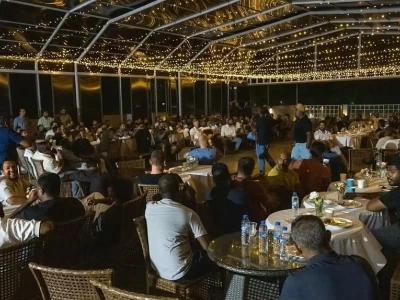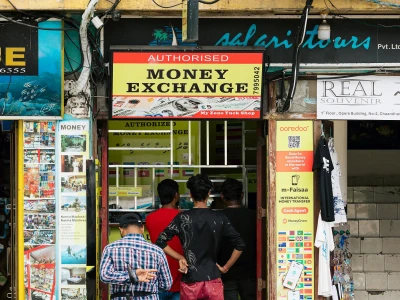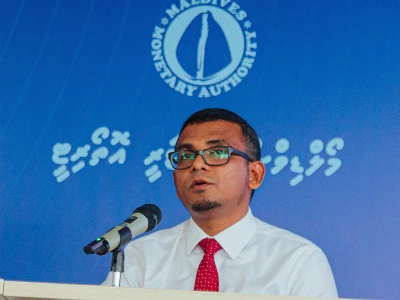
'Not enough dollars in revenue; Buy from black market?
MMA has introduced a new regulation requiring all foreign currency income to be deposited in local banks and exchange a portion.
Central bank of Maldives on Tuesday introduced a foreign exchange rule requiring tourism businesses to exchange a portion of their revenue at a Maldivian bank.
The purpose of the rule is to exchange a certain proportion of income from foreign currency sources to a Maldivian bank to resolve the dollar shortage. However, many in the industry, especially guesthouse businesses, are expressing dissatisfaction with the rules.
The Maldives Monetary Authority (MMA) on Tuesday introduced a new regulation requiring all foreign currency income generated by the tourism industry to be deposited in local banks.
As per the regulation, businesses active in the tourism industry and registered with the Maldives Inland Revenue Authority (MIRA) are required to re-register with MMA within 30 days. New registrants must also comply with this rule within the same timeframe.
Goods and service providers in the tourism sector are now required to submit details of their offerings to the MMA before the 28th of the following month.
The total foreign currency earnings must be deposited into a local bank’s foreign currency account, registered with MMA, within 87 days after the end of each month.
The regulation also specifies that transactions within the country must be conducted in Maldivian Rufiyaa, with certain exceptions. These include government-related transactions, remittances, foreign transactions, and sales to tourists, among others.
In a second regulatory change, MMA has amended the Foreign Currency Regulation, requiring tourism facilities to exchange a portion of their foreign currency earnings through local banks.
For resorts, hotels, and tourist vessels (Category A), $500 per guest must be exchanged.
Guesthouses (Category B) are required to exchange $25 per tourist.
Kaani Hotels CEO and National Hotels and Guesthouses Association President Abdulla Nasheed criticised the MMA rules in a post on X.
"Our average price per room per night for 2 pax is USD 100. Normally guests come for 3 to 4 nights. We will get USD 300 to 400 for the room. But we have to exchange USD 1000 for the 2 guests stayed in the room. Do we have to buy from the black market to exchange to the bank?," he asked.
'All trouble for guesthouses'
Although small guesthouses have less to market, there is also concern among businesses in this category.
Speaking on condition of anonymity, a guesthouse owner in an island in the Vaavu Atoll said this was not a good thing to do.
His guesthouse sells a room for $50 and $55 per night. Therefore, a large portion of the revenue will have to be exchange under the new rule.
Sharing his dissatisfaction with the rule, he said that all steps are taken in a way that inconveniences ordinary people.
"This is very difficult for small places. Just because the state doesn't get dollars doesn't mean the poorest person has to spend about $50," he said.
"Again, it is not right to make a rule without giving any notice. Industry people are not only from resorts. Small places should also get their opinions. It is not the people's problem that the government does not have dollars."
Some politicians have been speaking out against the rule.
"I don’t think the new MMA regulations will get more foreign currency into our banking system and increase gross reserves. It is more likely that this regulation will reduce gross reserves," former President Mohamed Nasheed, in a message to a tourism industry WhatsApp group.
"Resort owners will sell their beds and services at a very cheap price to a company in a foreign country that has less regulations and low tax, (perhaps Dubai) and this offshore company will sell the beds at the actual price to the tourist."
Businesses are not saving money in Maldives, Nasheed said, because they fear that a sudden legal change could lose their money because it is not safe for them.
"Entrepreneurs do not keep their capital in the Maldives because they fear that this country is not safe and that they might loose it through an overnight regulation. If we want to attract capital to our banking system we need to do the exact opposite of what MMA has done," he said.
"Less government involvement, less regulations, low taxes. The intention of the taxation system that was introduced in 2009 was with the intention to reduce Govt interventions in business."
Fayyaz Ismail, chairperson of opposition Maldivian Democratic Party (MDP), also expressed concern over the government's decision mandating that all tourism revenues be deposited in the Maldives and introducing a requirement for the mandatory surrender of US dollars for each tourist.
In a statement posted on X, Fayyaz highlighted that while the decision may help alleviate some pressure on the foreign exchange market, the manner of its introduction is problematic.
The former economic minister referenced a 2022 cabinet decision to require a percentage of revenue to be surrendered, with guarantees that foreign exchange earners' specific needs would be met.
Fayyaz also pointed out that this measure alone will not resolve the challenges in the dollar market. He called for further efforts to restore macroeconomic stability, including reducing government expenditure, aligning monetary policy, and improving the monitoring of money-changing institutions.
One of Fayyaz's key concerns is the potential negative impact on small guesthouses, mid-tier resorts, and the liveaboard industry. He emphasised that the policy, as it stands, could be particularly damaging to establishments that increasingly receive Maldivian rufiyaa from tourists rather than US dollars.




